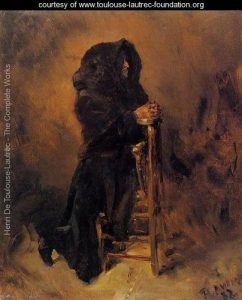
Image Courtesy of FreeDigitalPhoto.net
Before the world became as it is today, the ogress Hariti lived in the world with her five hundred children. She loved her children and doted on them. From the largest who stood taller than the tallest cypress to the smallest who could fit inside a snail’s shell, she loved them and doted on them. From the fiercest, whose roar shattered stones, to the most cunning, who could talk a thirsty man out of water, she loved them and doted on them all.
But feeding them was a chore, because they needed blood. Rich, red, sweet blood. And as Hariti doted on her five hundred young, only the sweetest, purest blood would do. Only the blood of human children would do. So she would steal children in the night to feed her young. From the strongest, who could pick up a river and move its bed, to the weakest, whose fingers dance on the back of your neck at night, she would feed them with a child stolen from her human neighbors.
And this caused her neighbors pain. But they feared her for she was an ogress of great power. Fear shook them. Fear held them still. Fear made them scream when they saw her. Fear kept them silent. And their pain grew.
Until their pain of their missing children grew so great they no longer could hold still. The pain of children missing from their homes could no longer keep them silent. Each human village chose an elder. Every village in the world chose an elder. From the Winding River of the West to the Great Sea of the East, each village picked an elder. From the Ice Mountains of the North to the Burning Sands of the South, each village sent an elder.
And once the elders of all the villages of all the world met together, they traveled as one to where Hariti lived with her five hundred children. Dust coated the elders’ feet. Mud coated elders’ ankles. Sand fleas bit the elders’ legs, leaving sores. Thorns scrapped the elders’ arms, leaving cuts. The wind blistered the elders’ faces. The sun burned the elders’ necks.
For many days the elders of all the villages of all the world traveled a distance the ogress could pass over with a single step. For Hariti was a powerful ogress and they were only human. From first harvest to second harvest to planting again, they traveled to where Hariti lived with her five hundred children. A distance the ogress could run in a single hour. For Hariti was a terrible ogress and they were only human.
Even so, the elders’ pain at the loss of their children held them to their task until they arrived at the home of Hariti where she lived with her five hundred young. There the ogress let the elders of all the villages of all the world come into her home.
She did not offer to clean their feet of the road’s dust. She did not offer them water to stop the road’s thirst. She did not offer them food to end the road’s hunger. For they were only human and she was an ogress of Rajgir. For her to hear their request instead of eating them outright was enough (though their blood was old and sour and held little appeal to her).
The elders asked her to stop stealing the children from the villages for they needed their children. The elders pleaded for her to stop taking the children from their villages for they needed their children to help them in the field. The elders begged her to stop stealing the children from their homes for they needed their children to help clean their houses. The elders entreated for her to stop taking the children from their homes for they needed their children to help them when they grew old.
The ogress Hariti heard their petition. From the morning sunrise to evening sunset she listened to their petition. When the elders were through talking, she laughed and sent them back home.
And that night she stole another human child to feed her young, for she loved her offspring and doted on them.
So things continued as they had been until such time as they no longer did.
In a village, close and not too far from where Hariti lived with her five hundred children, the Buddha reached enlightenment. Many traveled from the far reaches of the world to hear the Eightfold Path. From the Winding River of the West to the Great Sea of the East, people traveled to hear the wisdom of the Buddha. From the Ice Mountains of the North to the Burning Sands of the South, peopled traveled to learn the kindness of the Buddha. And those that traveled from River and Sea, from Mountains and Sand returned home. Every man and every woman returned to their villages from all around the world with stories of his wisdom and kindness.
Even Hariti heard the stories, but she cared little about the news, for kindness is not the way of an ogress. Instead of seeking out the Buddha, Hariti continued to steal children from her human neighbors for her young, for she loved her five hundred sons and daughters and doted on them.
So things continued as they had been until such time as they no longer did.
And when the humans in all the villages of all the world learned about the Buddha and his ways, they spoke among themselves. Maybe this man, full of wisdom and kindness, will know how to save their children. Maybe the Buddha could succeed where the elders of all the villages of all the world could not. Maybe the Teacher could fashion a change in the ogress.
Therefore each village in the world picked a new elder to go speak with the Buddha. A new elder needed to be chosen because much time had passed since the elders of all the villages of all the world had gone to petition Hariti in her house where she lived with her five hundred children. Many plantings had been planted and many harvests had been harvested. Unlike the ogress, the elders were only human and many had died.
Once the new elders had been picked they went with their petition to the Buddha. When the elders of all the villages of all the world arrived, the Buddha rinsed their feet clean of the road’s dust. He drew water from a well to stop the road’s thirst. And he took rice from his own rice bowl to end the road’s hunger. For they were only human and deserved kindness as every living thing does.
And once he knew they were rested, he took them to his favorite place under the pomegranate tree and listened to their request. From morning sunrise to evening sunset he listed to their petition. The elders of all the villages of all the world explained how the great ogress Hariti took their children to feed her brood of five hundred young. The elders of all the villages of all the world shared how night after night the powerful ogress Hariti stole into their homes and took their children and gave their blood to her monstrous young for only the sweetest, richest, and reddest blood was good enough for the rakshasa spawn. The elders of all the villages of all the world spoke how they missed their children and wept and gnashed their teeth every night, knowing the terrible ogress Hariti had eaten their children.
And when the elders of all the villages of all the world finished speaking the Buddha thought. For a night and a day and night again he thought on their request. And when he had thought long enough, he said he would talk to the great ogress Hariti, then he sent the elders of all the villages of all the world back to their homes. As soon as they had left, the Buddha picked up his rice bowl and went to the ogress’ home.
For things could not continue as they had been. It was time they no longer did.
Since the Buddha lived in a village close and not too far from where Hariti the ogress lived with her five hundred children, the journey only took from the time of first planting until first harvest. When he arrived, the Buddha’s feet were dusty, but not too dusty, and his ankles were muddy, but not too muddy. When he arrived, the ogress let the Buddha come into her home.
She did not offer to clean his feet of the road’s dust. She did not offer him water to stop the road’s thirst. She did not offer him food to end the road’s hunger. For even the Buddha was only human and she was an ogress of Rajgir, and kindness is not the way of an ogress.
So the Buddha sat and talked to the great ogress Hariti in her house while her five hundred children played around them. He asked after her largest who stood taller than the tallest cypress and the smallest who could fit inside a snail’s shell. And Hariti the powerful ogress spoke about her children for she loved them and doted on them. The Buddha marveled at the fiercest, whose roar shattered stones, to the most cunning, who could talk a thirsty man out of water. And Hariti, the terrible ogress responded for she loved her children and doted on them all. From the morning sunrise to the evening sunset the Buddha talked with Hariti about her children, from the strongest, who could pick up a river and move its bed, to the weakest, whose fingers dance on the back of your neck at night.
And as the sun set, the Buddha thanked her for her hospitality, although she had shown none other than letting the Buddha, who was only human, to sit in her presence. And once he thanked her, he stood, picked up his rice bowl carefully, and left, starting the journey back to his home, which was close and not too far from where the Hariti had her house with her five hundred children.
For the journey, she did not offer him new sandals for the road’s dust. She did not offer him water for the road’s thirst. And she did not pack him any food to end the road’s hunger. For while he was the Buddha, wise and kind, and Hariti knew his journey would take him until the second harvest before being completed, she was an ogress and kindness was not her way. That night, even after speaking from morning sunrise to evening sunset with the Buddha, she took three steps to a village and stole another human child to feed her young, for she loved her offspring and doted on them.
But when she had returned home, one of her children was missing. The powerful ogress Hariti went through her house and counted her five hundred children and one remained missing. She brought them all outside from the strongest, who could pick up a river and move its bed, to the weakest, whose fingers dance on the back of your neck at night. She counted them one by one, from at the fiercest, whose roar shattered stones, to the most cunning, who could talk a thirsty man out of water. And she checked again from the largest who stood taller than the tallest cypress to the second smallest who could fit inside an almond shell. And still her smallest child remained missing.
She cried from the pain of her missing child and went frantically looking for her missing son. From the Winding River of the West to the Great Sea of the East, she ran hunting for her smallest child. From the Ice Mountains of the North to the Burning Sands of the South, she jumped searching for her littlest son.
Sun, wind, thorn, sand flea, mud, and dust fled from her path as she searched the world for her child.
The humans in all the villages in all the world did nothing to help her in her search, and she did not ask them, for they were only human. Fear shook the men. Fear held the women still. Fear made the children scream when they saw her. Fear kept the elders silent. For Hariti was a terrible ogress, and they feared her.
When she had finished searching the world over, from the Winding River of the West to the Great Sea of the East, and from the Ice Mountains of the North to the Burning Sands of the South, Hariti returned to the house where she lived with her five hundred children and counted them again. Maybe the smallest of her children, who could fit inside a snail’s shell, had come home while she had searched.
So she counted her children and counted them again. For there were a lot of children and they kept moving; sometimes counting could go wrong. But the count remained the same. Still she could not find her youngest.
Then Hariti remembered the Buddha who had visited her. He was wise and kind, even though he was only human, maybe he would know what happened to her child. She made the journey to his home in a single step, for the Buddha lived close and not too far from the house where Hariti and her five hundred children lived.
When the powerful ogress arrived at the Buddha’s home, the Buddha rinsed her feet clean of the road’s dust. He drew water from a well to offer to her to stop the road’s thirst. And he placed rice in a second rice bowl to give to her to end the road’s hunger. For though she was a terrible ogress, she was a living thing and every living thing deserves kindness.
And when she had rested, he took her to his favorite place under the pomegranate tree and listened to her petition. Hariti told him of her counting and recounting of her children. She reported to him of searching from the Winding River of the West to the Great Sea of the East. She spoke about going through all villages in all the world from the Ice Mountains of the North to the Burning Sands of the South, hunting for her missing child. From morning sunrise to evening sunset she told him of her worry and pain. She petition him of how he must help her because no parent should feel what she felt right now.
And the Buddha listened and when the powerful ogress had finished speaking the Buddha thought. For a night and a day and night again he thought on her report. And when he had thought long enough, he asked her if she thought the humans felt like she did now when they found their children missing.
Contrite, she replied to the Buddha that the humans must indeed feel what she did right now.
The Buddha pointed out she had five hundred children where human parents did not have as many, so to have a child missing among so few must be even more painful.
Hariti agreed the suffering of human parents must be many times greater than hers when they discovered a missing child because they had so few children.
The Buddha stood a moment and picked a pomegranates from the tree and sat down again in his favorite place under the pomegranate tree. Hariti waited for him to say more, but he just smiled and opened the pomegranate, placing one sweet seed into his rice bowl and passed his own rice bowl to the ogress.
When she looked within she found the smallest of her children, so small he could fit inside a snail’s shell, eating the pomegranate seed. The terrible ogress cried out in relief to see her child safe.
Realizing that the human parents would never feel this relief for their missing children because the one which took them could never return them, Hariti vowed to protect all children but wondered how she would feed her five hundred children because they needed blood, sweet, rich, and red. The Buddha passed her the open pomegranate and asked her if the fruit would suffice. Upon tasting the fruit, the ogress was amazed at how sweet and rich and red the fruit was. Even better than the blood of human children. She agreed the pomegranate, one of the three blessed fruits, would more than suffice.
Thus the world as it is today knows Hariti the ogress in her role of the protector of children and women in childbirth. Her relationship with the Buddha developed and he gave her a Bodhi to withstand black magic and evil powers. He taught her how to cure the sick before he left this world. To this day you might go to her temples, but remember to bring a pomegranate with you in offering for she still has five hundred children to feed.
(words 2,837 – first published 5/29/2016)


